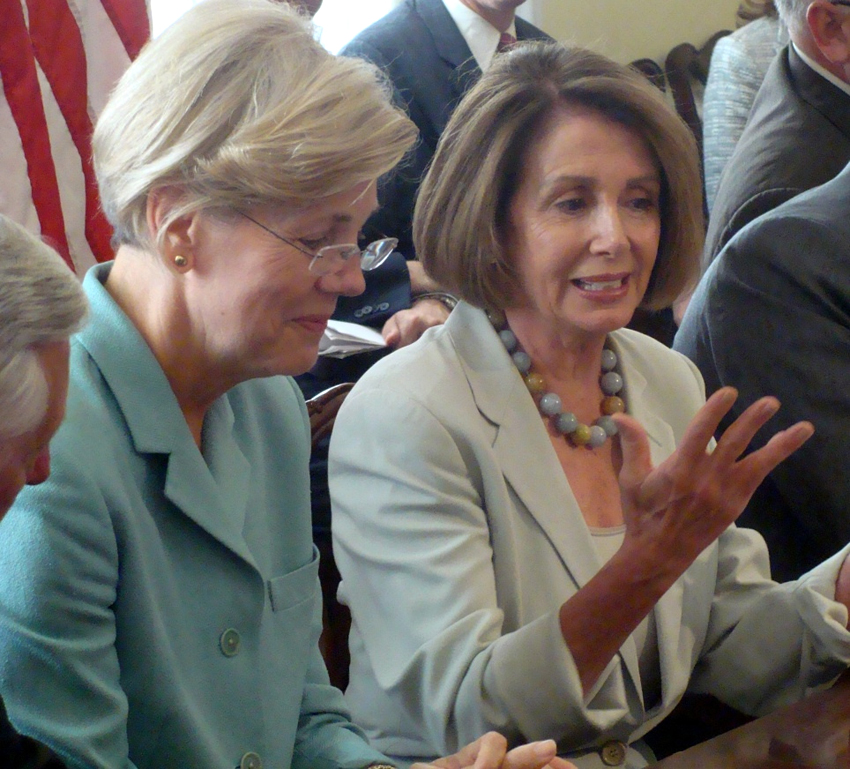Where Are the Women Candidates?

Photo by Leader Nancy Pelosi on Flickr
In case you’ve been under a rock for the past few months, you’re likely to have noticed a seemingly nonstop string of announcements lately from politicians tossing their hats into the ring. Look at the roundup of potential candidates for the mayor’s office or for the open Senate seat, and you’ll notice one thing in common: the bulk of the candidates currently seeking office are male.
City councilor-at-large Ayanna Pressley’s name has been floated as a potential mayoral candidate, but she has not yet announced a run, and Andrea Cabral told the Globe today that she wouldn’t be leaving her post as Public Safety Secretary to make a run for mayor. This isn’t exactly breaking news in Massachusetts. We did only just elect our first female Senator this past election cycle. (Progress, right?) Research has found that when women run for office, they have just as strong a chance to win their races as do men. So what’s keeping us from seeing more female candidates in Boston?
A new study from American University, the artfully titled “Girls Just Wanna Not Run,” explores this gender gap in political ambition, and its findings are rather scary. The researchers went into the study asking themselves a few questions: The past few years have been good ones for women in politics, they reasoned. From Nancy Pelosi to Sarah Palin, Hillary Clinton to Michele Bachmann, there has been a series of notable women taking center stage on the national political arena. Has this inspired a new generation of young women to run for office? Do they envision future candidacies at the same rate as young men? The answer was decidedly no. “There is a substantial and persistent gender gap in political ambition,” the researchers found. “Men tend to have it, and women don’t.”
Among the 2,100 college students surveyed between the ages of 18 to 25, the researchers found that 63 percent of women had never contemplated running for office, while only 43 percent of men had thought the same. Women tended to think of themselves as less qualified for political office, and found that working for a nonprofit was the more feasible way to enact societal change. And this is despite the fact that both sexes had similar responses in terms of their degree of political involvement and their attitudes toward politicians. How to account for this gap? The researchers identified five key factors which helped shape the respondent’s answers:
1. Young men are more likely than young women to be socialized by their parents to think about politics as a career path.
2. From their school experiences to their peer associations to their media habits, young women tend to be exposed to less political information and discussion than do young men.
3. Young men are more likely than young women to have played organized sports and care about winning.
4. Young women are less likely than young men to receive encouragement to run for office—from anyone.
5. Young women are less likely than young men to think they will be qualified to run for office, even once they are established in their careers.
“It’s terrifying, and a little bit of a wake-up call for the movement, and for parents,” says Adrienne Kimmell, the executive director of the Barbara Lee Family Foundation, a nonpartisan group that supports female candidates. “It’s not something that people are trying to do purposely” she notes, but it’s a “real call for programs at universities, elementary schools and high schools to encourage young women to run.” Kimmell cites two programs that the foundation has funded to help introduce young women to politics: an undergraduate program at Simmons College that provides internships to young women in the State House, and Harvard’s Oval Office program, which introduces graduate students to the rigors of running a campaign. And Emerge, a democratic training group, is also doing its part to “create a bench” of female candidates, Kimmell said. And in years like this, having a bench to draw from can really make a difference for female candidates, she notes. When the races are wide open, and they’re not facing incumbents, women tend to do extremely well in their campaigns. Now a few more women need to take the hint.


